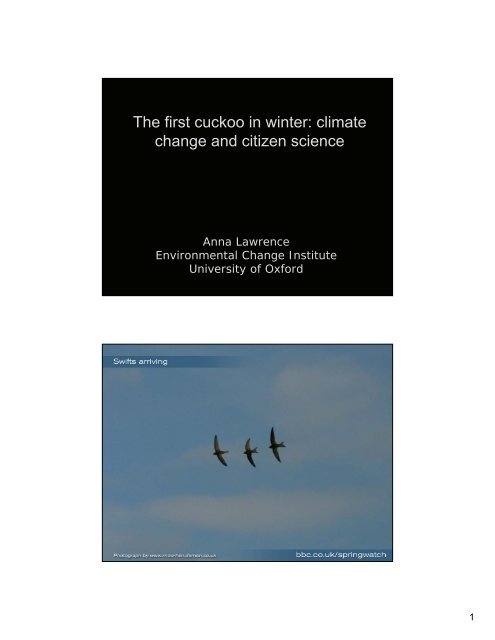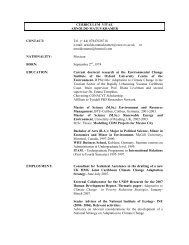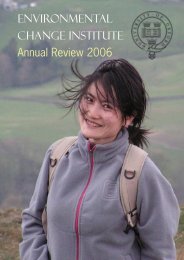The first cuckoo in winter: climate change and citizen science
The first cuckoo in winter: climate change and citizen science
The first cuckoo in winter: climate change and citizen science
Create successful ePaper yourself
Turn your PDF publications into a flip-book with our unique Google optimized e-Paper software.
<strong>The</strong> <strong>first</strong> <strong>cuckoo</strong> <strong>in</strong> w<strong>in</strong>ter: <strong>climate</strong><br />
<strong>change</strong> <strong>and</strong> <strong>citizen</strong> <strong>science</strong><br />
Anna Lawrence<br />
Environmental Change Institute<br />
University of Oxford<br />
1
What is <strong>citizen</strong> <strong>science</strong> <strong>and</strong> what does it<br />
have to do with ethnoecology?<br />
“scientific work <strong>in</strong> which a network of volunteers,<br />
many of whom may have no specific scientific<br />
tra<strong>in</strong><strong>in</strong>g, perform or manage research-related<br />
tasks such as observation, measurement or<br />
computation.”<br />
Based on local knowledge, local realities, <strong>and</strong><br />
local observation of nature – <strong>and</strong> a long tradition<br />
of natural history.<br />
Study<strong>in</strong>g it can tell us more about knowledge<br />
processes, <strong>and</strong> how values, knowledge <strong>and</strong> action<br />
are related.<br />
Pablo Eyzaguirre “noth<strong>in</strong>g like suburbanites for<br />
ornithological knowledge”<br />
Anja Christanell “need to encourage emotional<br />
reaction <strong>and</strong> culture of engagement”<br />
<strong>The</strong> theoretical questions<br />
Science studies: should we make decisions<br />
about the environment democratically, or<br />
by rely<strong>in</strong>g on experts? (Coll<strong>in</strong>s <strong>and</strong> Evans)<br />
Participatory governance: What contribution<br />
does participation make to empowerment<br />
<strong>and</strong> governance?<br />
Environmental anthropology: Is the<br />
supposed polarisation between scientific<br />
<strong>and</strong> local knowledge, between abstract /<br />
rational <strong>and</strong> contextualised / emotional<br />
useful? (Milton)<br />
2
Put another way …<br />
What difference does it make who<br />
gathers the evidence?<br />
Are there really ‘two ways of<br />
know<strong>in</strong>g’? [Berkes et al., 2000]<br />
[what, only two?]<br />
My model for th<strong>in</strong>k<strong>in</strong>g about this:<br />
Society<br />
(People)<br />
Lawrence, A., 2006 “No personal motive?” Volunteers,<br />
biodiversity <strong>and</strong> the false dichotomies of participation.<br />
Ethics, Place <strong>and</strong> Environment 9(3): 279-298.<br />
Nature<br />
3
Society<br />
(People)<br />
Society<br />
(People)<br />
Motivation<br />
?<br />
Policy<br />
processes<br />
?<br />
Motivation<br />
?<br />
Policy<br />
processes<br />
?<br />
Environmental<br />
activities<br />
Environmental<br />
governance<br />
Environmental<br />
activities<br />
Environmental<br />
governance<br />
Record<strong>in</strong>g?<br />
Informatio<br />
n<br />
(external)<br />
Interpretation<br />
?<br />
Observation<br />
?<br />
Nature<br />
Management<br />
?<br />
Observation<br />
?<br />
Nature<br />
Management<br />
?<br />
4
Society<br />
(People)<br />
Motivation<br />
?<br />
Policy<br />
processes<br />
?<br />
Values <strong>and</strong><br />
experience?<br />
Experienc<br />
e (<strong>in</strong>ternal)<br />
Empowerment<br />
/ motivation?<br />
Environmental<br />
activities<br />
Environmental<br />
governance<br />
Record<strong>in</strong>g?<br />
Informatio<br />
n<br />
(external)<br />
Interpretation<br />
?<br />
Observation<br />
?<br />
Nature<br />
Management<br />
?<br />
5
Longest biological data set <strong>in</strong> Brita<strong>in</strong><br />
• 1736 Robert Marsham ‘Indications of Spr<strong>in</strong>g’ – for 62 years<br />
• 1875-1947 Royal Meteorological Society coord<strong>in</strong>ated<br />
national network (155 observers <strong>in</strong> 1899)<br />
• Individual recorders provide valuable data <strong>in</strong> the gap<br />
• 1998 Phenology Network revived<br />
• 2000 Jo<strong>in</strong>ed with Woodl<strong>and</strong> Trust<br />
• 2005 Website starts l<strong>in</strong>k<strong>in</strong>g to <strong>climate</strong> <strong>change</strong> discourse<br />
(Kyoto, disappear<strong>in</strong>g arctic ice)<br />
• Now > 24 000 members (1/2 on-l<strong>in</strong>e)<br />
• 2005 L<strong>in</strong>ked to BBC for Spr<strong>in</strong>gwatch / Autumnwatch<br />
• More than 100 000 people contributed 200 000<br />
observations <strong>in</strong> 2005<br />
• 2007 Renamed ‘Natures Calendar’<br />
6
Why this engages British people<br />
We love to discuss the weather<br />
Garden<strong>in</strong>g is the no. 1 hobby<br />
We have 200 years of amateur<br />
natural history …<br />
7
<strong>The</strong> Dutch ‘Nature’s Calendar’<br />
Uses ‘Early Birds’, a Sunday morn<strong>in</strong>g nature programme<br />
with ½ million listeners<br />
4000 registered recorders<br />
More women than men – contrast with traditional record<strong>in</strong>g<br />
“People can see what the impacts are. And it’s not<br />
someth<strong>in</strong>g that’s far north – the polar bears – but it’s just<br />
<strong>in</strong> your own back yard. And that’s a very strong element of<br />
this network.”<br />
Objectives: underst<strong>and</strong><strong>in</strong>g impact of <strong>climate</strong> <strong>change</strong> on<br />
nature <strong>and</strong> society; ‘raise sense of urgency among the<br />
public’<br />
But does it?<br />
– ‘I haven’t a clue’.<br />
– I was a computer person but now I’m chang<strong>in</strong>g<br />
– <strong>The</strong> problem is that even when you are walk<strong>in</strong>g <strong>in</strong> the forest<br />
you’re constantly with<strong>in</strong> the network … ‘oh that’s flower<strong>in</strong>g’…<br />
it’s part of your life<br />
10
<strong>The</strong> wider media<br />
How do scientists use this data?<br />
We analysed 133 biological papers<br />
based on data collected by<br />
volunteers<br />
77% discussed data accuracy<br />
– 47% checked the data<br />
69% acknowledged the volunteers<br />
31% considered the effect on the<br />
volunteers<br />
11
Reasons given for <strong>in</strong>volv<strong>in</strong>g<br />
volunteers (n=133)<br />
Species monitor<strong>in</strong>g<br />
Education / awareness<br />
Increase geographical coverage<br />
Conservation plann<strong>in</strong>g<br />
More cost effective<br />
Scientific research<br />
Water quality monitor<strong>in</strong>g<br />
Foster ownership / stewardship<br />
Promote <strong>citizen</strong> / government<br />
cooperation<br />
Use local knowledge<br />
72<br />
25<br />
15<br />
14<br />
14<br />
9<br />
8<br />
8<br />
4<br />
But other researchers recognise …<br />
Role <strong>in</strong> ‘public underst<strong>and</strong><strong>in</strong>g of <strong>science</strong>’ /<br />
‘demystify<strong>in</strong>g <strong>science</strong>’<br />
Enhanced ‘scientific th<strong>in</strong>k<strong>in</strong>g’ of <strong>citizen</strong>s<br />
– E.g. propos<strong>in</strong>g hypotheses to expla<strong>in</strong><br />
observations<br />
– Suggest<strong>in</strong>g alternative methods<br />
Some ‘unscientific’ aspects<br />
– E.g. see<strong>in</strong>g their results as valid <strong>in</strong> isolation<br />
from others<br />
– Lack of skills <strong>in</strong> systems th<strong>in</strong>k<strong>in</strong>g / ecological<br />
background<br />
– Reluctance to survey r<strong>and</strong>om sites<br />
2<br />
12
% of papers published <strong>in</strong> each year<br />
phenology <strong>and</strong> <strong>climate</strong> <strong>change</strong> publications<br />
25<br />
20<br />
15<br />
10<br />
5<br />
0<br />
1997<br />
1998<br />
1999<br />
2000<br />
2001<br />
2002<br />
2003<br />
2004<br />
2005<br />
2006<br />
Quality / validity<br />
Data checked (British<br />
nature calendar)<br />
Hierarchy of experts<br />
Sheer sample size<br />
(Dutch nature calendar<br />
coord<strong>in</strong>ator)<br />
Rely on trends <strong>and</strong><br />
consistency across<br />
different surveys (rather<br />
than absolute numbers)<br />
13
Mean<strong>in</strong>g <strong>and</strong> feel<strong>in</strong>g<br />
• As we engage with our environment<br />
we perceive mean<strong>in</strong>gs <strong>in</strong> it<br />
• <strong>The</strong>se give th<strong>in</strong>gs their value<br />
• <strong>The</strong>se mean<strong>in</strong>gs become known to us<br />
through the emotions they <strong>in</strong>duce<br />
• Our actions are a result of our<br />
motivations / values / feel<strong>in</strong>gs <strong>and</strong><br />
therefore mean<strong>in</strong>gs<br />
Kay Milton 2002<br />
Personal mean<strong>in</strong>g<br />
Christ<strong>in</strong>e d’Albert from Herefordshire:<br />
for her birthday on 22 May her mother would<br />
always bake her a cake, pok<strong>in</strong>g dr<strong>in</strong>k<strong>in</strong>g straws <strong>in</strong><br />
the top <strong>and</strong> <strong>in</strong>sert<strong>in</strong>g a bluebell <strong>in</strong>to each straw<br />
among the c<strong>and</strong>les. ‘My memory goes back to<br />
1944 ... In recent years I have watched bluebells<br />
flower<strong>in</strong>g much earlier – more like 22 April <strong>and</strong> as<br />
early as 19 April <strong>in</strong> 2001.’<br />
‘A few m<strong>in</strong>utes record<strong>in</strong>g nature notes can give<br />
hours of pleasure, <strong>and</strong> I’m thrilled to know that<br />
they can be useful too <strong>in</strong> the study of <strong>climate</strong><br />
<strong>change</strong>.’<br />
www.naturescalendar.org.uk/f<strong>in</strong>d<strong>in</strong>gs/past.htm<br />
14
Mean<strong>in</strong>g-mak<strong>in</strong>g: patterns, self-consciousness,<br />
<strong>and</strong> shar<strong>in</strong>g<br />
“Has anyone seen hawthorn blossom this month? Last Sunday (01/10/2006) I<br />
found a section of hawthorn hedge with quite a few blossoms mixed <strong>in</strong> with<br />
ripe fruit ! ! ! ! Is this very unusual or have I not been look<strong>in</strong>g too carefully <strong>in</strong><br />
previous autumns?” 3 October 2006<br />
“Marsh Marigold has a regular late flower<strong>in</strong>g <strong>in</strong> the pond <strong>in</strong> my garden <strong>in</strong><br />
Bristol, <strong>and</strong> is <strong>in</strong> flower now, but I haven't kept a note of dates <strong>in</strong> past.” 9<br />
October 2006<br />
“over the past four months … I have been watch<strong>in</strong>g a small group of 7spots<br />
….<strong>The</strong>y stayed <strong>in</strong>active until the after the solstice but then slightly<br />
shifted positions dur<strong>in</strong>g early January. At the beg<strong>in</strong>n<strong>in</strong>g of February, more<br />
appeared <strong>and</strong> they were clearly mov<strong>in</strong>g around …What does all this mean? I<br />
th<strong>in</strong>k that the ma<strong>in</strong> cluster was just 'asleep' but became active when the sun<br />
became more constant <strong>and</strong> the temperatures rose. <strong>The</strong>y then had to hide away<br />
when the snow (followed by heavy ra<strong>in</strong>) with low night temperatures came <strong>in</strong><br />
mid-February ..... Some may have died <strong>in</strong> this shift<strong>in</strong>g of positions.<br />
I wouldn't like to make too much of this sequence (although I have observed<br />
the same site for many years over the solstice period).”<br />
http://www.woodl<strong>and</strong>community.org.uk/forums/messagelist.asp?commid=6&groupid=190&topicid=1060&fromloc=topiclist<br />
‘How lyrical am I allowed to be?’<br />
‘I remember a particularly lovely late afternoon <strong>in</strong> October,<br />
… I was busy [monitor<strong>in</strong>g the] hedge <strong>and</strong> then when I<br />
turned round … there was nobody else around <strong>and</strong> there<br />
was just the moon <strong>and</strong> it was clear <strong>and</strong> the sun <strong>and</strong> the<br />
sheep <strong>and</strong> it was just – absolutely gorgeous’<br />
‘I must have been a hunter-gatherer <strong>in</strong> the past because I<br />
love see<strong>in</strong>g the diversity of all the th<strong>in</strong>gs <strong>in</strong> a hedge, that<br />
really turns me on, you can walk along <strong>and</strong> see all the<br />
different th<strong>in</strong>gs at the different times of year, <strong>and</strong> that<br />
gives me quite a buzz, I mean actually spend<strong>in</strong>g the time<br />
look<strong>in</strong>g at a hedge, the wonder of that, you know, that had<br />
an effect on my bra<strong>in</strong> anyway, it’s sooth<strong>in</strong>g’<br />
‘you can get depressed you know if you look at the whole<br />
big picture, you just have to do what your little bit can be’<br />
Participants <strong>in</strong> group discussions, Sussex <strong>and</strong> Leicestershire, 2005-6<br />
15
Citizen <strong>science</strong>? Or excuses to<br />
be <strong>in</strong> nature?<br />
• ‘I must have walked more miles across the wild brooks than I ever did<br />
when I was <strong>in</strong> the military, <strong>and</strong> I just enjoy it … [after retir<strong>in</strong>g] I used to<br />
go for the same walk every day but I thought ‘”this is not right, I’ve got<br />
to f<strong>in</strong>d someth<strong>in</strong>g to do” <strong>and</strong> s<strong>in</strong>ce I’ve done this you meet people, have<br />
a chat, it’s just relax<strong>in</strong>g …’<br />
‘I mean walk<strong>in</strong>g on a spr<strong>in</strong>g morn<strong>in</strong>g is lovely, but when<br />
there’s a purpose to it that’s even better isn’t it’<br />
• ‘it’s nice, but as long as you do it with a purpose <strong>in</strong> m<strong>in</strong>d <strong>and</strong> at the end<br />
of it you feel you’ve done someth<strong>in</strong>g really quite good’<br />
‘you’d feel guilty, wouldn’t you, sort of w<strong>and</strong>er<strong>in</strong>g along<br />
not do<strong>in</strong>g anyth<strong>in</strong>g very much except look<strong>in</strong>g’<br />
Experience, governance <strong>and</strong> social<br />
learn<strong>in</strong>g<br />
Little engagement with<br />
governance/ most feel powerless<br />
to <strong>change</strong> anyth<strong>in</strong>g<br />
Monitor<strong>in</strong>g biodiversity presents<br />
often deeply emotional <strong>and</strong><br />
mean<strong>in</strong>gful experiences<br />
Few opportunities to <strong>in</strong>ternalise<br />
the mean<strong>in</strong>g of those experiences<br />
<strong>The</strong> learn<strong>in</strong>g cycle needs to be<br />
closed through reflection <strong>and</strong><br />
learn<strong>in</strong>g processes<br />
People love opportunities to do<br />
this<br />
16
Society<br />
(People)<br />
Motivation?<br />
Policy<br />
processes<br />
?<br />
Values <strong>and</strong><br />
experience?<br />
Experienc<br />
e (<strong>in</strong>ternal)<br />
Empowerment<br />
/ motivation?<br />
Environmental<br />
activities<br />
Environmental<br />
governance<br />
Record<strong>in</strong>g?<br />
Informatio<br />
n<br />
(external)<br />
Interpretation<br />
?<br />
Observation<br />
?<br />
Nature<br />
Management<br />
?<br />
‘What prevents us … from pursu<strong>in</strong>g … action … is not<br />
plausibly a lack of data. It is much more centrally a<br />
failure to <strong>in</strong>tegrate those data, a failure to make them<br />
real to ourselves.’ Maguire, 1996<br />
“does it matter if the opposition between emotion <strong>and</strong><br />
rationality is a myth? … Any failure to put the th<strong>in</strong>gs that<br />
people hold most sacred at the centre of public decision<br />
mak<strong>in</strong>g makes democracies, at best, undemocratic”<br />
Milton, 2002<br />
17
Conclusions<br />
• We adapt based on our experience (which<br />
is based on <strong>in</strong>formation <strong>and</strong> mean<strong>in</strong>g)<br />
• Yes, we need those cultural heritages<br />
• And to fill <strong>in</strong> the ‘local scale’ that models<br />
cannot<br />
But we also need<br />
– consciousness of our mean<strong>in</strong>gs <strong>in</strong> the world<br />
– cross-fertilisation of different sets of knowledge<br />
<strong>and</strong> <strong>in</strong>formation<br />
Thanks to:<br />
Esther Turnhout (co-author of work from<br />
Netherl<strong>and</strong>s)<br />
Sarah Gillett (co-author of survey of <strong>citizen</strong><br />
<strong>science</strong> projects)<br />
Star Molteno (research for this presentation)<br />
18






